News & Stories
2015

News
The Wonderful World of 5-G Wireless Systems
The world is now using the 4-G wireless systems but the research community is already hard at work creating the next generation 5-G wireless systems, expected to arrive by 2020. What sets the future 5-G apart from the current 4-G? It will have a data capacity 1000 times greater, connecting up 1000 times more devices with energy efficiency 1000 times better, translating into faster bit rate and significantly lower latency. In addition, it will support new application scenarios such as machine-to-machine communications. Such goals are not easily achievable. Earlier speaking in the HKUST’s Science-for-Lunch Talk, Prof Vincent Lau has shared the new vision and applications as well as technical challenges and opportunities.
The sharing can now be viewed here.
2014
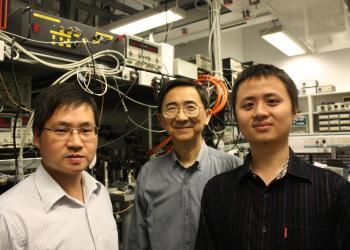
News
HKUST Physicists Control Photon's Shape for Record Loading Efficiency into a Cavity
A research team at the Hong Kong University of Science and Technology (HKUST), led by Prof Shengwang Du, Associate Professor of Department of Physics, succeeded in controlling photon’s shape, and reached a record photon loading efficiency of 87% into a cavity. The scientific breakthrough can be used to build nodes of a quantum network based on cavity quantum electrodynamics (CQED) and will help advance the development of quantum communication. The research findings were published recently in Physical Review Letters, one of the most prestigious journals in physics.
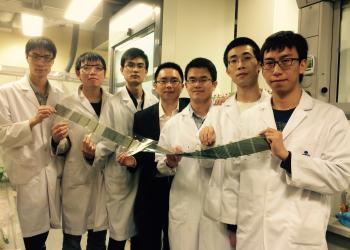
News
HKUST develops materials for record efficiency polymer solar cells
A research team at the Hong Kong University of Science and Technology (HKUST) has developed a family of polymer and fullerene materials that enabled multiple cases of high-efficiency polymer solar cells. The team, led by Prof He Yan of the Department of Chemistry, discovered a material design motif that led to three new polymers and over ten high-performance material combinations yielding solar cell efficiencies of up to 10.8%, a new record for single-junction polymer solar cells.
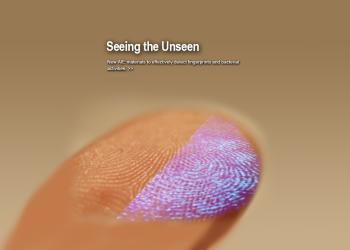
News
Seeing the Unseen
A HKUST research team led by Prof Benzhong Tang,Stephen Kam-chuen Cheong Professor of Science, Chair Professor of Chemistry at HKUST, has discovered new aggregation-induced emission (AIE) materials which could be used for applications in forensic science and bacterial imaging.
The new AIE materials produce fingerprints of much better quality as compared to carbon powder, saving 90 per cent of the time in evidence collection. They also make a more accurate and stable agent in detecting bacterial activities.
Prof Benzhong Tang said AIE gives fingerprints of much better quality and more efficiently than the carbon powder which is now being used by police.
AIE does not involve a transfer. Police can simply take a picture of a fingerprint, which turns fluorescent when stained with the AIE material, then send the image to a smart device for comparison on a database.
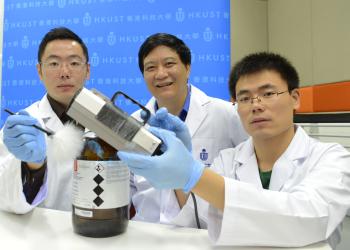
News
HKUST Discovers New Aggregation-Induced Emission (AIE) Materials for Applications in Forensic Science and Bacterial Imaging
A Hong Kong University of Science and Technology research team led by Prof Benzhong Tang - Stephen Kam-chuen Cheong Professor of Science, Chair Professor of Chemistry and a member of the Chinese Academy of Sciences, has discovered new AIE materials which could be used on visualizing fingerprints and revealing bacteria with greater effectiveness. The new materials not only produce fingerprints of much better quality as compared to carbon powder, saving 90 per cent of the time in evidence collection, they also make a more accurate and stable agent in detecting bacterial activities.
Prof Tang has developed numerous AIE materials ever since his discovery of the AIE phenomenon in 2001, they were applied in a wide range of areas including high-performance OLEDs, cancer screening and environmental monitoring. His latest discoveries have expanded AIE’s applications into the arena of forensic science and bacterial detection.
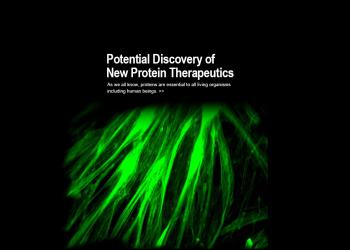
News
Potential Discovery of New Protein Therapeutics
As we all know, proteins are essential to all living organisms including human beings. Most of the enzymes are made of proteins, and there are countless enzymes on earth that function as catalysts, playing an important role in speeding up biological reactions in living cells. We simply cannot live without enzymes. Recently, a team of scientists at the IAS HKUST-Scripps R&D Laboratory has discovered 250 new proteins with previously unidentified activities. The research was led by Prof Paul Schimmel, the Ernest and Jean Hahn Professor of Molecular Biology and Chemistry at the Scripps Research Institute (California and Florida) and a visiting professor of the IAS. Detailed findings were published in Science in July.
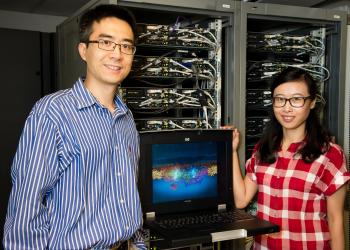
News
HKUST Chemists Unveil Mechanisms of Photosynthesis for Promising Renewable Energy Development
A research team at the Hong Kong University of Science and Technology (HKUST) has solved a long-standing question in photosynthesis which provides insight into the design of artificial photosynthetic systems that may serve as alternative energy devices by effectively utilizing the sunlight. The research was led by Assistant Prof Xuhui Huang and Prof Yijing Yan of the Department of Chemistry and their findings were recently published in the prestigious journal Nature Communications.
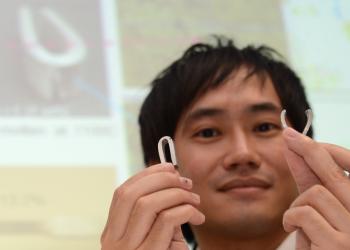
News
HKUST Engineering Team Invents Cheaper, Lighter and Stronger Aluminium Composite for Wide Applications
A Hong Kong University of Science and Technology (HKUST) research team led by Prof Yui-bun Chan from the Department of Civil and Environmental Engineering, with support from leading global aluminium producer UC RUSAL (SEHK:486, EuroNext: RUSAL/RUAL, Moscow Exchange: RUALR/RUALRS), has discovered a new aluminium composite – Fiber Reinforced Aluminium. This new material is stronger than existing aluminium, cheaper and lighter than steel, and can also be used with insulation panels designed to produce a building envelope system that is safer, cheaper, more energy-efficient and easier to mount. The project is now undergoing its final phase and is expected to complete in 2015.






